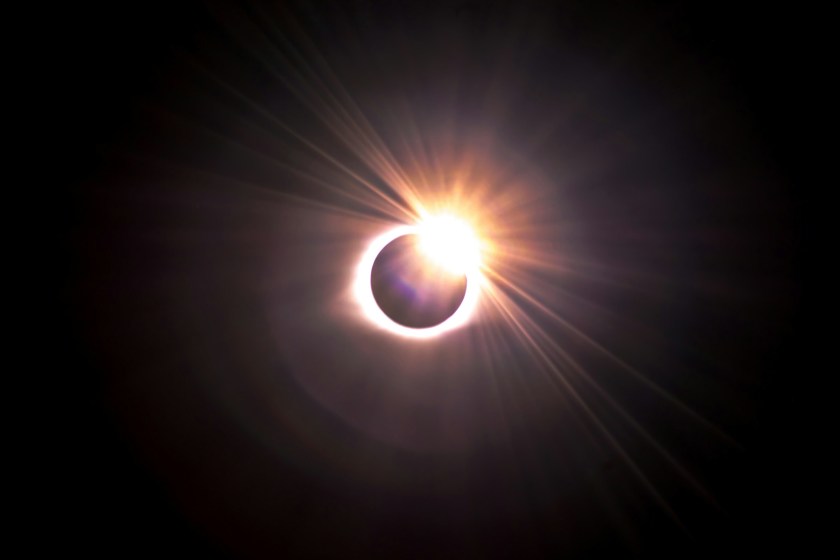
How to Protect Your Sight During the 2024 Solar Eclipse
Written by Dr. Elaine Ramos, OD, Nationwide Vision
We’re gearing up for one of the most amazing natural phenomena – a Solar Eclipse! On April 8th, 2024, the Moon will block the Sun for a short period of time. While only some of the United States will experience totality, when the Moon completely covers the Sun, everyone will be able to see the Moon slowly blocking part of the Sun.
But wait, don’t start watching yet! Before you gaze at the Sun, there are a few essential guidelines to follow and dangers to be aware of when witnessing this rare astronomical event. Elaine Ramos, OD, an expert optometrist on the Nationwide Vision team in Surprise, Arizona, is here to share the importance of proper solar eclipse viewing techniques. Before taking part in this exciting celestial event, you need to make absolutely sure that you are using the appropriate equipment to keep your eyes safe. Not taking the proper steps could put your eyes at risk for permanent damage.
Why is Looking at a Solar Eclipse Dangerous?
On a normal day, the Sun is much too bright to look at, even with polarized sunglasses. Staring at the sun for a few seconds can significantly damage your eyes, leading to a condition called solar retinopathy. When you stare at the Sun, you are placing the center of your vision, the fovea, directly into the light’s path. The Sun’s intense light then causes damage to the fovea and surrounding retinal cells, causing blurry vision or even loss of central vision.
Even during a solar eclipse, when the Moon’s shadow partially blocks sunlight, it doesn’t completely block out the Sun, even in the path of totality. The Sun is still producing intense light, meaning that without the right protection, conditions like solar retinopathy are still possible. Another name for solar retinopathy is actually eclipse retinopathy because of how dangerous this event is on the eyes. So even if it seems like the light isn’t as bright, the light that still makes it to your eyes is just as intense as any other day. This is why staring directly at the solar eclipse without any protection is going to place your eyes at a significant risk for damage.
To determine how much of the Sun will be blocked in your location, use the Eclipse Cities tracker.
Safe Ways to Experience the Solar Eclipse in 2024
While viewing a solar eclipse without protection can damage your eyes, there are many ways to view the solar eclipse without putting your vision at risk.
Specialized Eclipse Glasses
If you want to directly view the solar eclipse, buying a pair of trusted solar eclipse glasses is the best way to protect your eyes. These specialized lenses are like extremely strong sunglasses, but more than 100,000 times darker. With solar eclipse glasses, you can look directly at the Sun without any risks or side effects.
ISO 12312-2 is the international standard for these lenses, and to ensure your sight is protected, your solar eclipse glasses must have this certification. The American Astronomical Society provides an extensive list of reputable solar eclipse glasses to help you find the best equipment for this year’s celestial event.
Observatory Events
Observatories often host events during the solar eclipse to educate the community and provide a safe viewing experience for you and your family. If you live near an observatory, they may provide solar eclipse glasses or have an HD video display showing the eclipse in real time. This is a fantastic way to experience the solar eclipse safely, even if you’re not in the path of totality.
At-Home Sun Viewer
If you forgot to purchase solar eclipse glasses or don’t live near an observatory, you can do an at-home crafts project to create your own Sun Viewer. While the name may say otherwise, you should never look directly at the Sun, especially with this device. However, the Sun Viewer is like a movie screen in a box – the longer you make your Sun Viewer, the larger the image you’ll see.
Safely Enjoy this Rare Astronomical Event
As we count down the days to this incredible event, it’s important to prepare for a safe and enjoyable viewing experience. Plus, the United States isn’t expected to witness a solar eclipse for another 20 years, so it’s essential to ensure your eyes are protected. Before you experience the celestial event of the year, secure your safety equipment to avoid an unexpected visit to the eye doctor.

About Dr. Elaine Ramos, OD
Dr. Elaine Ramos, OD, received her Bachelors of Science degree from California State University, Fullerton and earned her Doctorate of Optometry from Marshall B. Ketchum University. She completed a residency in vision therapy and neuro-rehabilitation from the State University of New York College of Optometry.
Prior to joining Nationwide Vision, Dr. Ramos was an assistant professor at Western University College of Optometry in Pomona, CA and adjunct professor at Midwestern University in Glendale, AZ where she practiced in the pediatrics and vision therapy clinics. She currently resides in Peoria, AZ with her husband, baby girl, and corgi named Butters.